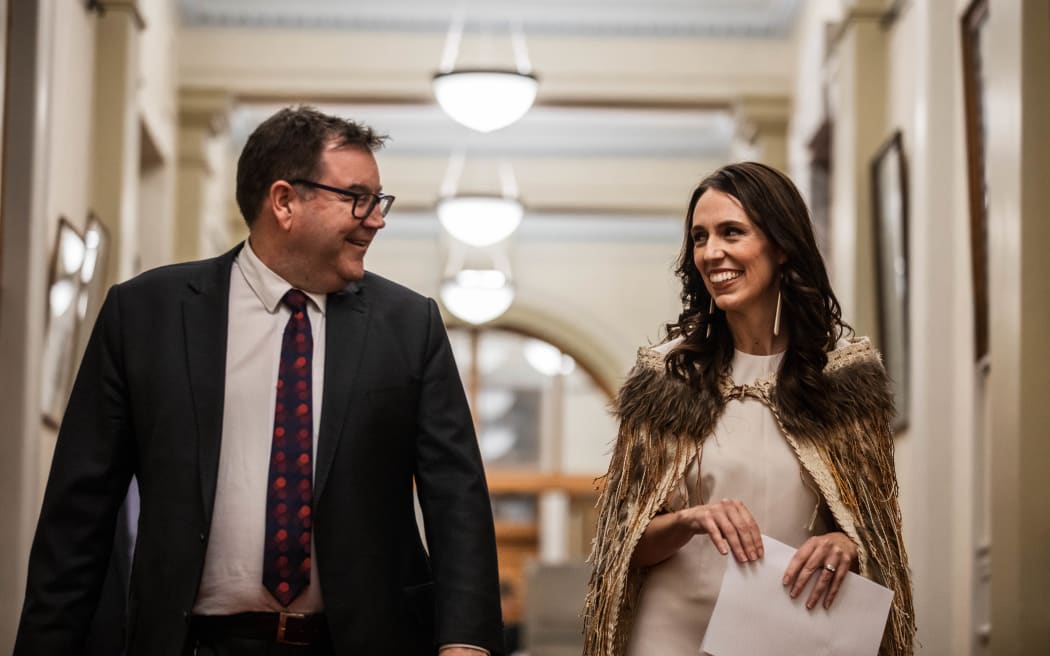Former New Zealand prime minister Jacinda Ardern has used her valedictory speech to Parliament to ask the House to take the politics out of climate change.
In her speech, Ardern said when she became prime minister she knew she wanted climate change to be “front and centre”.
“I called it our nuclear moment — I believed it then and I believe it still now.
“We have seen first hand the reality of our changing environment … when crisis has landed in front of us I have seen the best of this place.”
Ardern said one of the only things she wanted to ask on her departure was for the House to take the politics out of climate change.
Her government had worked to uphold the Treaty of Waitangi by crossing the bridge more often, she said.
That included the creation of the Māori Crown portfolio, growth of te reo Māori, the establishment of the Māori Health Authority and the creation of Matariki — the first national Māori holiday, she said.
‘Not always easy’
“The path we travel as a nation will not always be linear and it won’t always be easy, but I’m glad I was in part of a government that took on the hilly bits.”
One of the hardest things about covid-19 was the unknowns, Ardern said.
“A valedictory is not the time to summarise a pandemic, no one has the time for that type of group therapy.”
Former prime minister Jacinda Ardern’s valedictory speech today. Video: Parliament
Ardern said she remained forever grateful that science was “on our side” and that she was surrounded by wonderful smart compassionate people trying to do the right thing.
She said they did not always get it right but “we went in as a nation with a goal to look after one another and we did”.
Other things, such as a sense of security, were lost along the way and so much of the information swirling around during the pandemic was false, Ardern said.
Ardern described how she tried and failed to convince a protester that they were relying on totally false information.
She said she could not single-handedly pull someone out of a rabbit hole but that perhaps collectively “we could stop them from falling into it in the first place”.
“Debate is critical to a healthy democracy but conspiracy is its nemesis.”
Struggled over mosque attacks
Ardern said she still struggled to talk about the mosque attacks in Christchurch on 15 March 2019, but the Muslim community had humbled her beyond words.
She said she was unsure what the response of one of the survivors of the attack would be when she met him in the immediate aftermath.
“What came next is one of the most profound memories I have of that period, he thanked us. Here was someone who had been through one of the most horrific experiences I could imagine and he thanked New Zealand and expressed gratitude for his home.”

The most significant task for us as a nation was “to live up to the expectations that those experienced it have of us, to deserve their thanks”.
Ardern became emotional at the end of her valedictory speech describing herself as sensitive, somewhat negative, and “a crier and a hugger”.
But said she “would rather be criticised for being a hugger than being heartless”.
She closed her speech telling the House that she hoped she had demonstrated anyone could be a leader.
‘You can lead, just like me’
“You can be anxious, sensitive, kind and wear your heart on your sleeve, you can be a mother or not, you can be an ex-Mormon or not, you can be a nerd, a crier, a hugger — you can be all of these things and not only can you be here, you can lead, just like me.”
Ardern received a standing ovation at the end of her speech, before hugging Finance Minister Grant Robertson (who had been her deputy) and then Deputy Prime Minister Carmel Sepuloni.
Yesterday, it was announced the former prime minister was taking on two new roles: A voluntary position as Special Envoy for the Christchurch Call and trustee of Prince William’s Earthshot Prize.
Ardern resigned in January saying she no longer had “enough in the tank” to lead the country.
Former prime minister Helen Clark said Ardern would be remembered largely as the prime minister whose pandemic-era policies saved thousands of Kiwis’ lives.
This article is republished under a community partnership agreement with RNZ.
Article by AsiaPacificReport.nz






